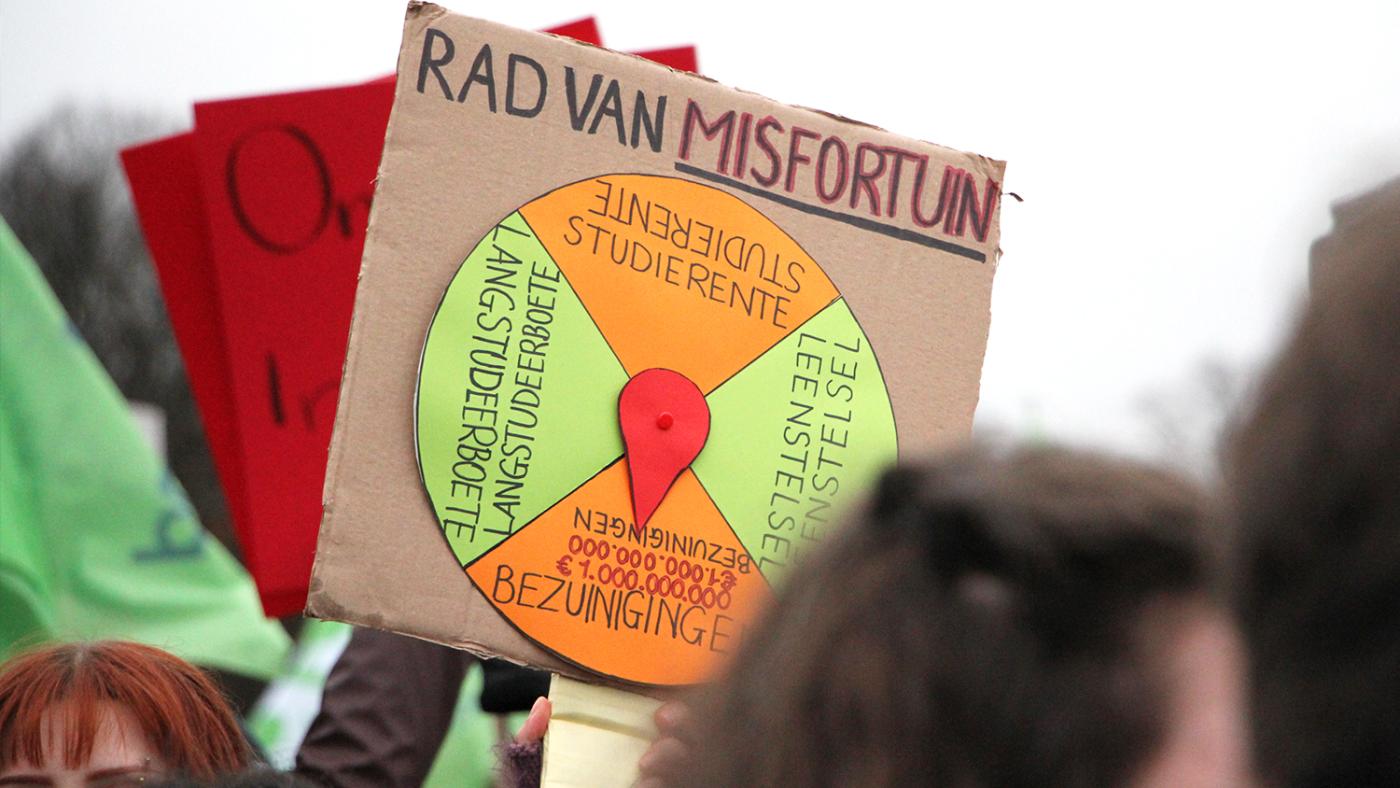Interest rate for 2025 unveiled: 2.57 percent
An unprecedented, manipulative measure that will screw us over much more than the late graduation fine

In October, I received an email from DUO, the government agency that grants student loans, informing me about the interest rate for the next calendar year. Between 2015 and 2023, students in the Netherlands stopped receiving a monthly allowance, which forced many of them to take up more money from DUO. Those students are known as the "unlucky generation" and I am one of them. In the email, DUO says: "An interest rate of 2.57 percent interest will be charged on any study debt you may have already built up.” An increase of 0.01 compared to 2024.
I clicked the email away just as thoughtlessly as I had read it. I'm not exactly surprised by the government's policy regarding students, especially when it concerns small changes like these. Even so, I just kept thinking back to the email. I wondered: "People have been protesting the massive cuts to the higher education budget with big demonstrations and petitions. Why am I not hearing anything about this interest rate when students have been so angry about the fine for students who take longer to graduate?"
If you don't pay attention...
This is not the first time they have increased the interest rate. After keeping it at 0 percent for years, DUO raised it to 0.46 percent in 2023 – so little that people barely reacted to it. In 2024, the interest rate suddenly increased to 2.56 percent, which got some attention in the form of a lawsuit and a protest. Still, I'm surprised that students are not mentioning that in the demonstrations.
If you think about it for a moment, this is a much more annoying measure than the fine. It is inconspicuous, but, before you know it, it can easily cost you four times the delayed-study fine! I think this is a sneaky, manipulative gesture from our government.
Let me give you a concrete example of how this can turn out. Let's assume the interest rate of 2.57 percent remains stable, out of convenience. A student with an outstanding study debt of 40,000 euros, to be repaid in 35 years, will end up paying 52,000 euros. And that's if they start repaying immediately. If they don't and decide to wait two years to start paying, they will get over 2,000 more in debt because the interest still applies.
All loan providers must inform us, except the government
In short, if you are not paying attention, you will suddenly be faced with four hefty fines for taking "too long" to graduate, even if you do graduate on time. And that's because you're getting an interest rate on a loan that you thought would not have any interest rates. When setting up the loan system instead of the basic student grant, the government gave us the impression that the interest rate would remain 0. Ministers said that students did not have to be afraid to borrow. All that nice talk, only to change the rules later on.
Legal Advice Wanted, a legal consultancy firm, noticed the same thing. Their lawyers argue that the Dutch government has not fulfilled its duty of care by not providing citizens with sufficient information about the supposedly "free" loans students have been applying for since the loan system was introduced. Meanwhile, private loan providers must follow a very strict set of rules. For example, banks must inform their customers about risks to prevent excessive debt.
One would expect the government to do the same. After all, citizens must be able to trust that the government has their best interests at heart and will protect them from unnecessary risks or unwanted consequences. Unfortunately, we found out once again that the government is not there for us students.
Inequality and wellbeing
Students who earn less money after graduating and students whose parents don't have a lot of money will be hit the hardest by the rising debt. They will now think twice about their choice of study. After all, they used to count on 35 years of "interest-free" repayment, but now they must take an additional 20,000 euros in debt into consideration. Some might consider looking for a job instead of going to university.
The message is: "Hurry up and pay off that debt. Just do it, as soon as possible." By asking for interest, DUO is rushing students, even though we'd been promised that the loan would have few consequences for our lives. But that's not true: the debt will impact mortgage applications, marriage and other fiscal partnerships. That's why one would prefer to get rid of it as fast as possible.
How nice is that, if you're an art student living in uncertainty about exhibitions and subsidies? How nice is that, if you're not able to work a side job because your studies are demanding and your parents do not earn enough to help you out? No matter how much you want to pay off that debt, you simply can’t. It’s great that the debt can be forgiven after 35 years, but you will still carry that entire time.
Inequality of opportunity is, therefore, increasing and students' wellbeing is deteriorating. The university can invest all it wants in mental health coaches and workshops, but if the source of stress only gets worse, this is money wasted.
We were the guinea pigs for a government that wanted to try out the loan system again. But, when it didn't work out, we had to make do with a meagre compensation of less than a year’s tuition fees while also getting interest on a student loan that was supposed to be "free". As a result, we are saddled with much higher costs and stress. This is sad, it’s discouraging, and it proves once again that the government doesn’t care about students.